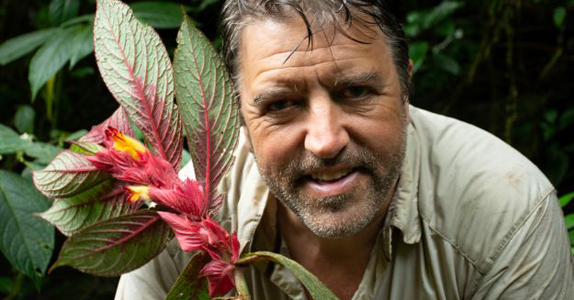
People & Business
John L. Clark PhD Joins Botany Staff at Selby Gardens
January 30, 2023 – Sarasota
Marie Selby Botanical Gardens recently welcomed Dr. John L. Clark to its staff as a full-time research botanist.
Affiliated with Selby Gardens as a research associate since 2009, Clark has spent his professional career discovering and documenting plant diversity. His work concentrates on the plant family Gesneriaceae, or gesneriads, an important focus of Selby Gardens’ botanical research and a notable component of its living plant collection.
“John is an incredibly valuable addition to our Botany team at Selby Gardens,” said Jennifer Rominiecki, president and CEO of Marie Selby Botanical Gardens. “His vast and impressive knowledge of gesneriads will add to and enhance Selby Gardens’ world-renowned expertise in epiphytic plants.”
An evolutionary biologist as well as a botanist, Clark studies plant systematics, evolution, and biodiversity, focusing on the identification, classification, phylogeny, and taxonomy of neotropical gesneriads. Gesneriads serve as scientific models for understanding broad patterns in the evolution, pollination, and diversification of plants. About a third of gesneriads are epiphytes (a type of plant that grows on another plant without harming it), and Clark’s expertise will advance Selby Gardens’ research mission. The Gardens’ Downtown Sarasota campus is the only botanical garden in the world dedicated to the display and study of epiphytic orchids, bromeliads, gesneriads, ferns, and other tropical plants.
Since the late 1980s, Clark has spent extensive time exploring South and Central America and the Caribbean to research its flora, including six years as a resident botanist in Ecuador. He has published more than 150 species names and collected more than 17,000 plant specimens, including the discovery of hundreds of species of plants. As a research associate for Selby Gardens prior to his full-time hiring, Clark collaborated with staff scientists and added significantly to the Gardens’ collections. He brings an exceptional body of photography and additional plant specimens to Selby Gardens that will further enhance its research collection. “Once we tally it up, I’m pretty sure that John will have made one of the most significant donations of specimens to our collection in the history of the institution,” said Bruce Holst, Selby Gardens’ vice president for botany.
Clark came to Selby Gardens from The Lawrenceville School in New Jersey, where he was the Aldo Leopold Distinguished Teaching Chair in the science department. There he directed annual research expeditions to Ecuador and Cuba, where students and faculty explored remote regions to document and study plant biodiversity. Collections from those expeditions yielded new species to science and species thought to be extinct. Clark’s earlier career was at The University of Alabama, where he was curator of the herbarium and associate professor in the Department of Biological Sciences. Clark continues to serve as a research associate with the Royal Botanic Garden Edinburgh and the Smithsonian National Museum of Natural History.
Clark earned his doctorate in biology from The George Washington University and his bachelor’s degree in forest biology from the University of Vermont. His interest in gesneriads was sparked while serving as a U.S. Peace Corps volunteer in Ecuador, where he lived from 1994 to 1998 and worked as a field botanist with the National Herbarium of Ecuador and the Jatun Sacha Foundation. Clark lived in Ecuador again in 2002 as a Fulbright scholar, and he continues to return annually while directing student-run programs in ecology and systematics.



You must be logged in to post a comment Login